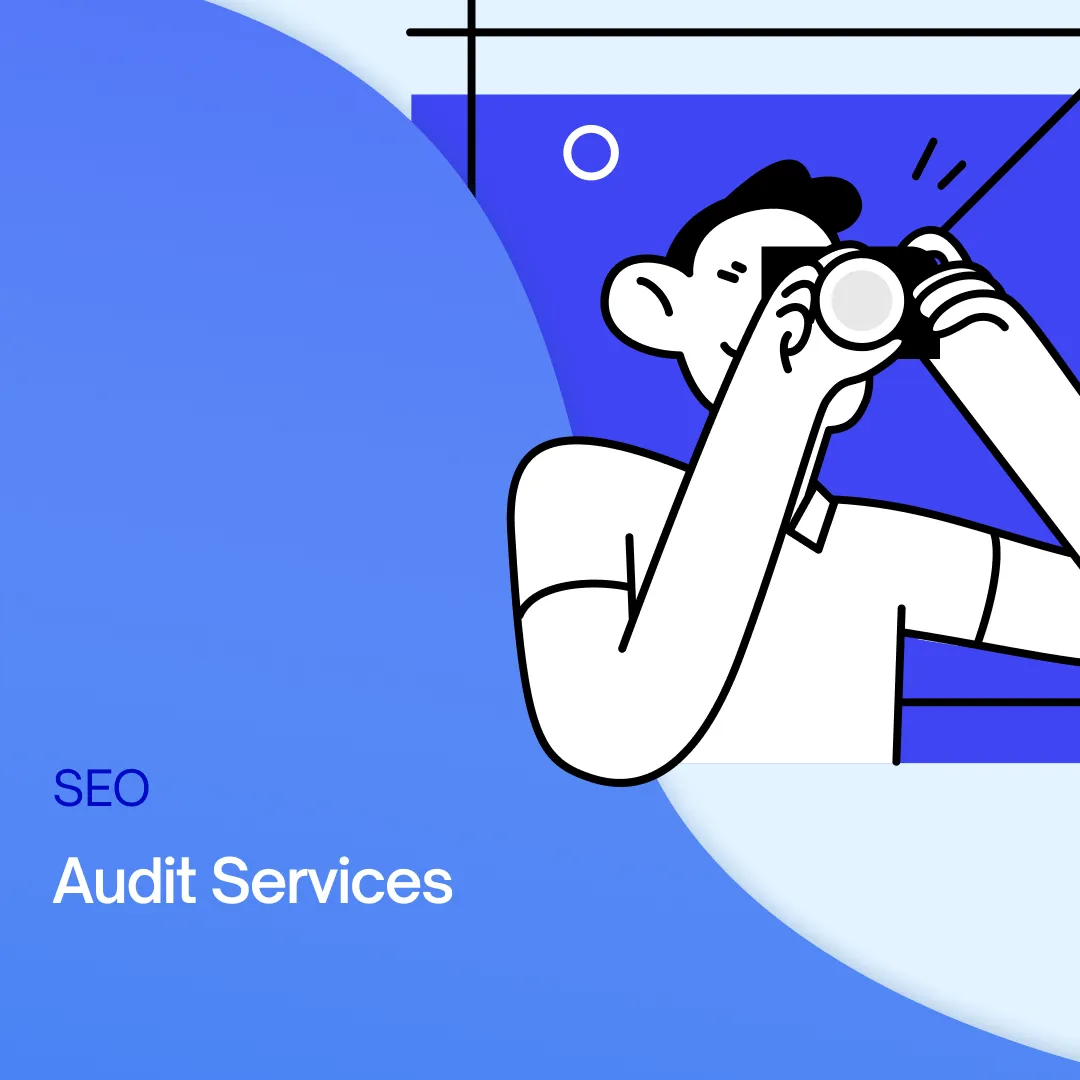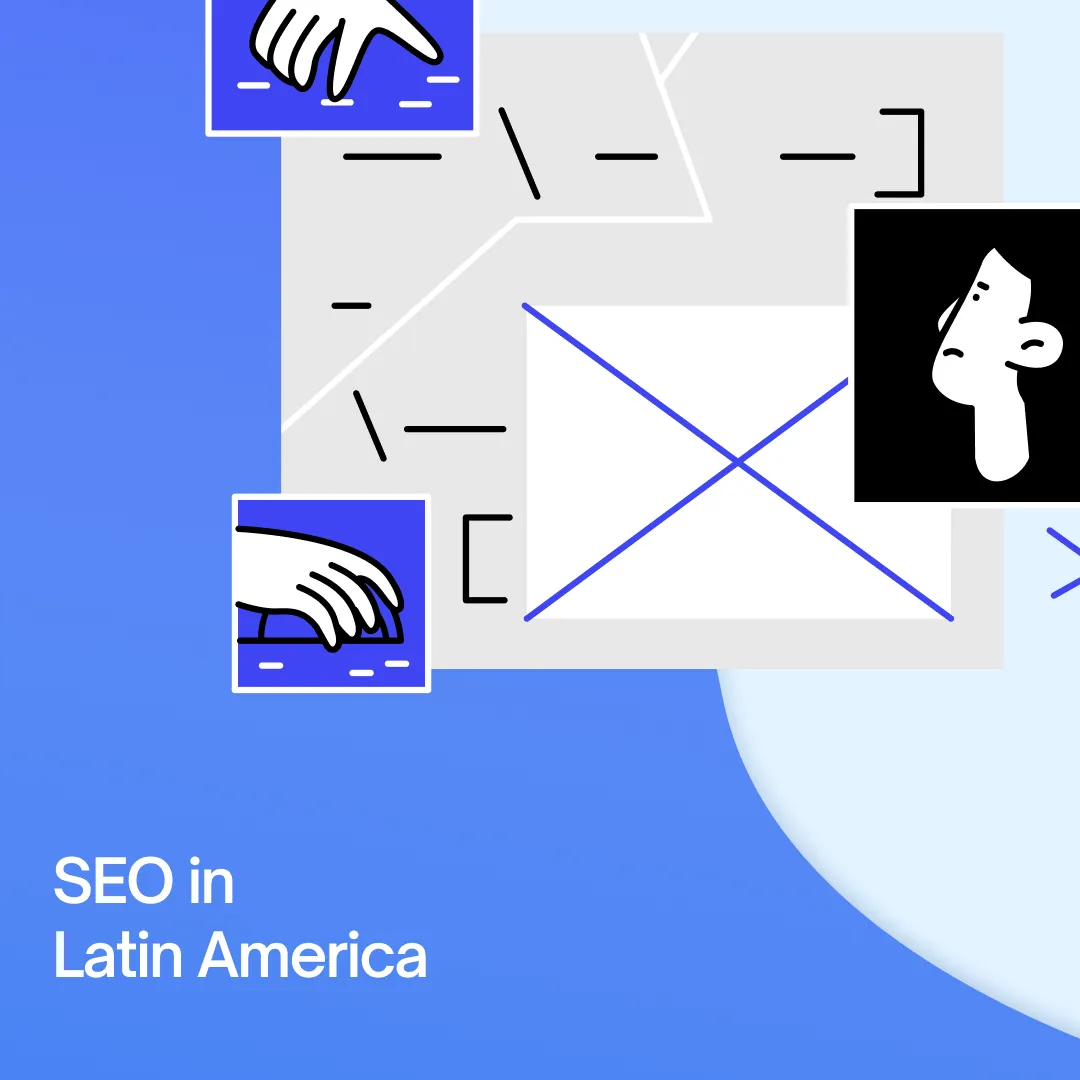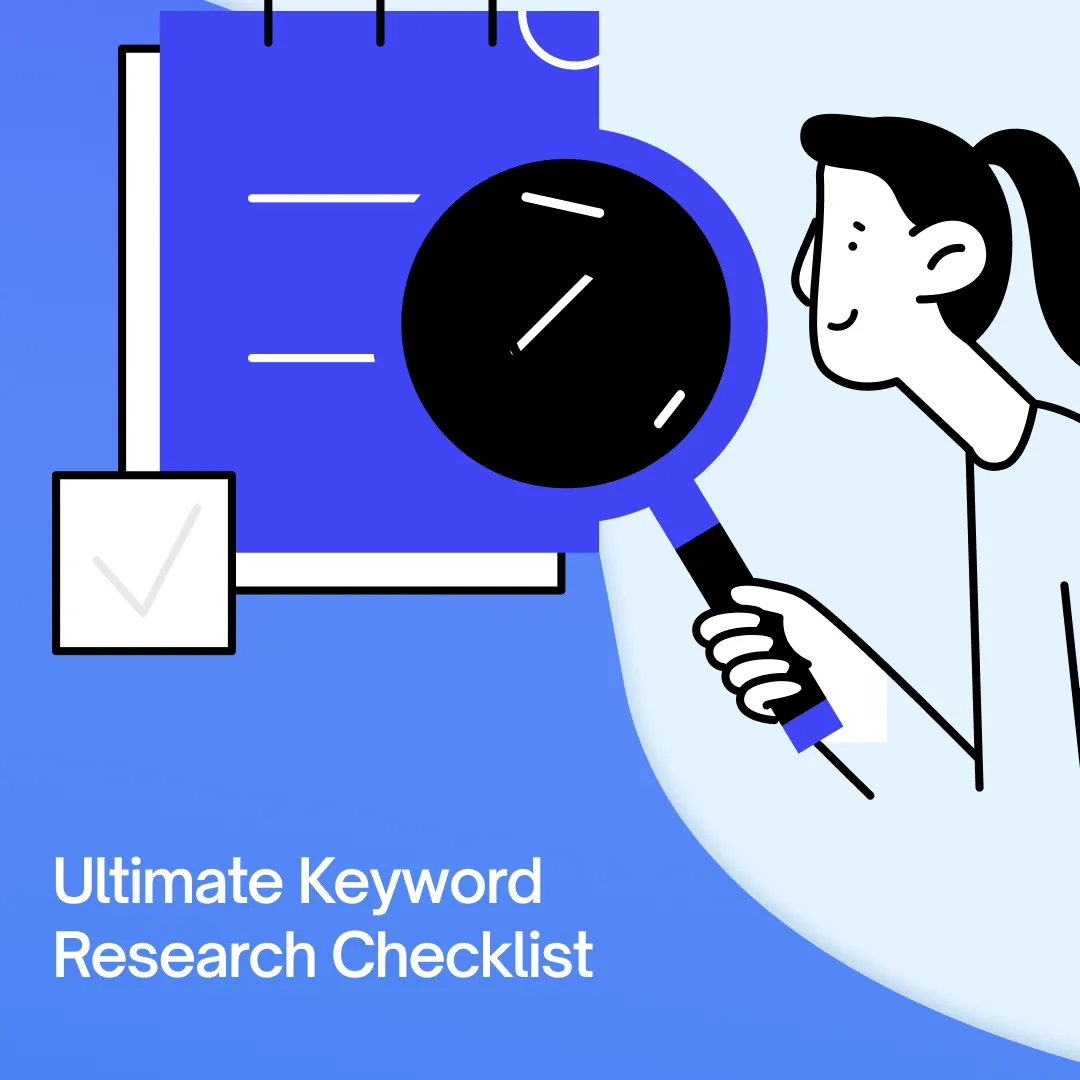AI SEO is the future. Success depends on choosing an expert partner. The right team turns AI insights into measurable growth, higher visibility, and stronger credibility.
But not every firm delivers the same mix of content strategy, technical expertise, and AI optimization.
We’ve analyzed the top agencies, weighing strengths, weaknesses, and tradeoffs.
Keep reading to find the agency that matches your goals and actually moves the needle for your business.
Pro tip: Looking to future-proof your content strategy? Bluethings is the AI-powered SEO agency built for the new search era. We blend data, creativity, and machine learning to help brands dominate rankings. Contact us today and let’s build your next growth engine together.
TLDR: Our Top 3 AI SEO Agencies in 2025
- Bluethings: Best overall for white-hat, data-driven SEO and scalable AI strategies. The agency suits ambitious brands seeking agile, scalable, AI-powered growth.
- RevenueZen: Works for B2B companies that want GEO, SEO and content strategy.
- iPullRank: Offers relevance engineering, content engineering, and generative AI.
Why AI Matters in SEO Today
AI has changed how SEO works at every level. It’s no longer about manual keyword research or endless backlink spreadsheets.
SEO is now about precision, prediction, and performance.
In keyword research, AI tools analyze intent faster than any human could.
They surface gaps, trends, and search opportunities hidden under generic terms. For content, AI helps scale production without losing relevance. It identifies what audiences engage with and generates outlines or drafts that match search intent.
Link-building gets sharper, too.
AI spots authority sites and potential partnerships through smarter data matching. It cuts outreach time and increases link quality.
Although not exactly a part of AI SEO, performance analysis is where AI shines brightest. And you can definitely use AI in your SEO campaigns for that.
That’s because AI processes vast amounts of analytics data, revealing what’s actually driving visibility and conversions. That insight powers quicker, better decisions across campaigns.
For businesses, this means efficiency and scalability. Campaigns move faster. Reporting gets clearer. Insights arrive in real time instead of weeks later.
However, the impact of your AI SEO isn’t always visible in your Google Analytics reports. It can be visible, though, in your sales reports as you’re getting more leads:
The agencies getting it right use AI wisely, so let’s see who you can partner with.
Our Methodology
We assessed each agency using a structured, transparent framework designed for executive decision-making.
The goal was simple: measure performance, innovation, and trustworthiness in a way that reflects real-world results.
The scoring criteria covered five key areas:
- Innovation: how effectively AI tools are built into core SEO workflows
- SEO ROI: measurable outcomes in traffic, rankings, and conversions
- Transparency: clarity in reporting and communication
- Workflow integration: how seamlessly they integrate AI SEO with traditional SEO
- Client satisfaction: feedback consistency and long-term retention
To ensure accuracy, we drew from verified client case studies, executive interviews, and direct access to performance dashboards and analytics platforms. Each data point was cross-checked for authenticity and consistency.
We didn’t assign scores lightly.
Agencies went through a multi-stage review process, with qualitative insights weighed alongside quantitative metrics. This approach is how we rewarded agencies that delivered tangible, repeatable success.
Every ranking in this guide comes from a measured process and careful evaluation, backed by results rather than marketing polish.
The methodology reflects how these agencies perform under real conditions, with live data and real stakes. It’s designed to give decision-makers clarity on where innovation meets proven performance.
The Top 10 AI SEO Agencies in 2025
AI SEO shifted the focus from rankings to visibility, credibility, and being discovered by both people and machines.
Pick the wrong agency and you waste time, budget, and resources. Pick the right one and AI insights turn into measurable growth.
Every agency has a different strength. Some dominate content strategy. Others excel at technical SEO or AI-specific optimization.
Use this guide to find a partner that matches your goals. Scalable AI strategies, high-quality content, or full-service SEO support.
Choose what works for you.
1. Bluethings
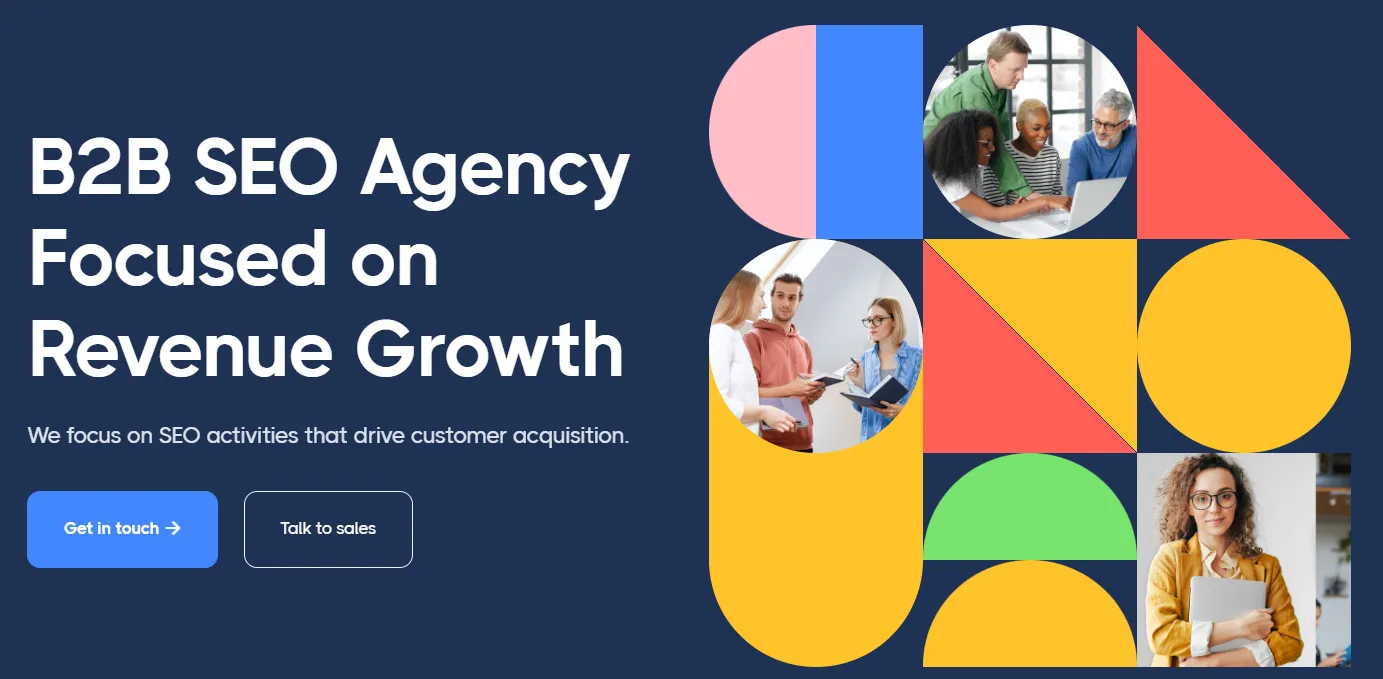
Bluethings is an SEO agency that creates custom, white-hat strategies for B2B SaaS, financial services, and international SEO. Our full-service approach covers technical SEO, keyword research, content creation, link building, mobile optimization, and ongoing SEO management.
Here’s how we help brands win in the era of AI-powered search.
In this context, ranking is about how large language models understand your content. We specialize in LLM SEO, making sure your brand shows up inside AI Overviews, SGE results, and generative answers, and not just on the old blue links.
That means structuring your pages and clusters in ways AI systems can easily interpret, cite, and reuse as credible sources.
Our team also works on AI citations and entity optimization, which is how we train search engines and LLMs to associate your brand with expertise, trust, and topical authority. We don’t just optimize content for clicks; we design it to be read, quoted, and recommended by AI. Whether it’s building knowledge graphs, fine-tuning schema, or mapping your internal link network for context clarity, Bluethings turns traditional SEO into a future-ready visibility strategy.
Our results speak for themselves:
For our client Hurom, we increased AI citations significantly. We did this with content built for humans, search engines, and AI. That means expertise-driven writing, clear formatting, SEO-optimized headings that match search intent, and schema markup for FAQs and structured data. All of it helps AI understand and reference the content.
Our link-building strategy complements this. More brand mentions across the web increase the chance AI will pick up Hurom.
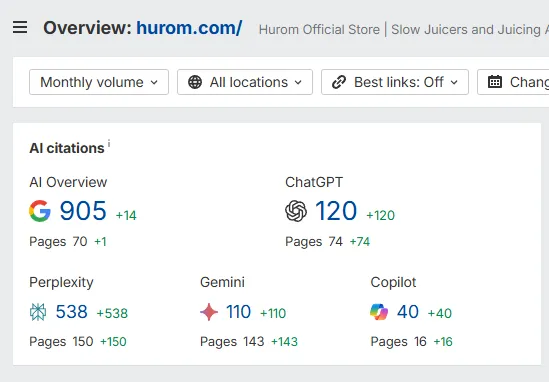
We also work with our partners at inBeat Agency on influencer content for Hurom. That expands the brand’s reach, builds credibility, and drives visibility.
The formula is simple: More quality branding equals more impact in AI search.
We did the same for our client Content Allies.
Bluethings recently ramped up content production for Content Allies with a focus on expert-driven material. The content comes from their ops team, who bring direct insights from clients and deep knowledge of the B2B podcasting space.
We handle content strategy and editing, guiding their team to write for both traditional SEO and AI SEO. Expertise, clear formatting, and link-building remain central to our approach.
It’s an approach that pays off.
Content Allies is now ranking in AI overviews for a key term, featuring Jake Jorgovan, the founder and CEO. That visibility builds credibility and positions the brand as an authority.
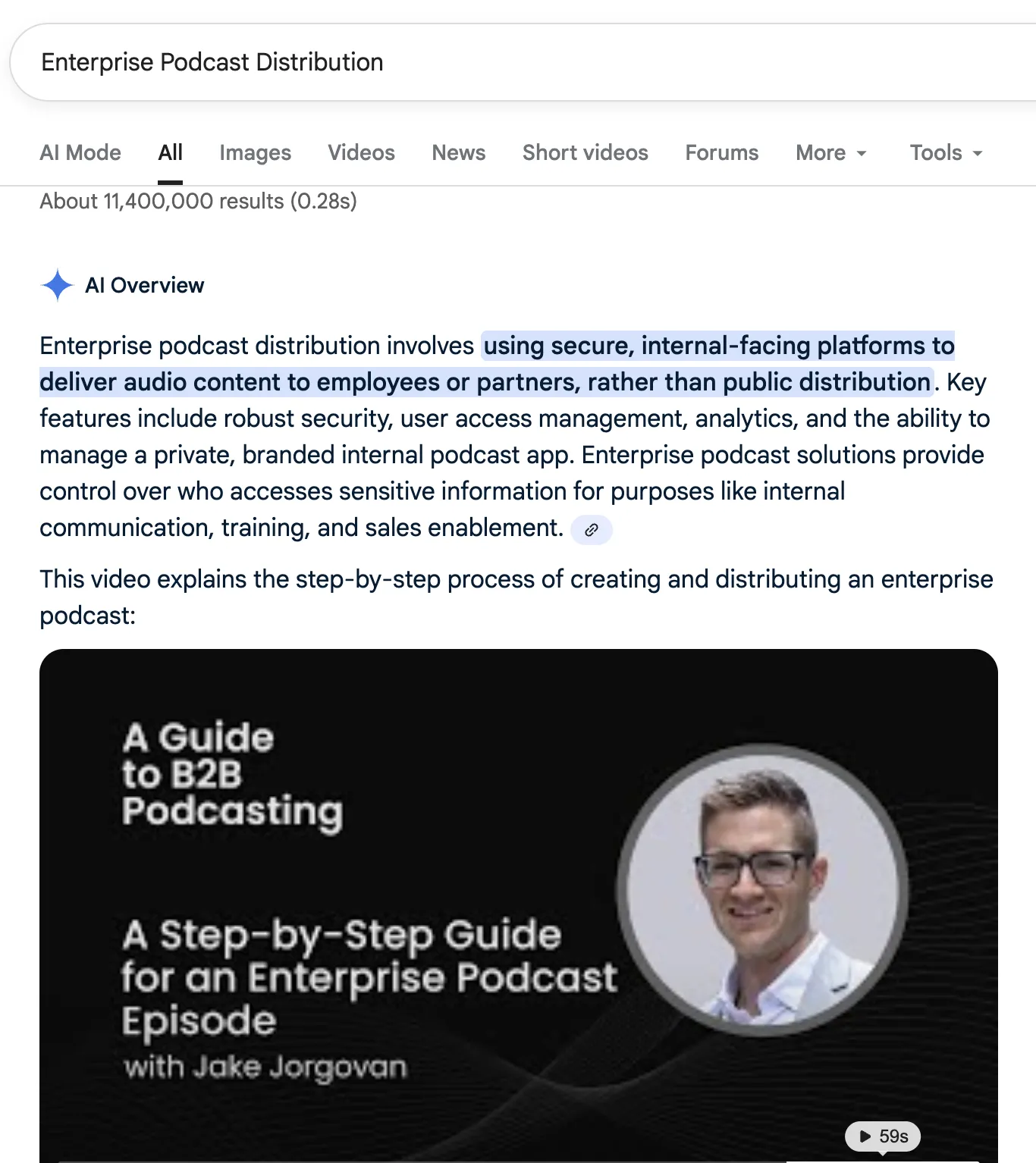
Pros:
- Specializes in AI & LLM SEO
- Proven results in AI Overviews & citations
- Expert-driven content and link-building
- Strong technical SEO foundation
- Works across B2B SaaS, finance & global SEO
- Human + AI-optimized writing style
- Collaborative with influencer & PR partners
Cons:
- High demand limits onboarding slots
- Complex projects may require phased rollout
- Results depend on consistent content flow
2. eSEOspace
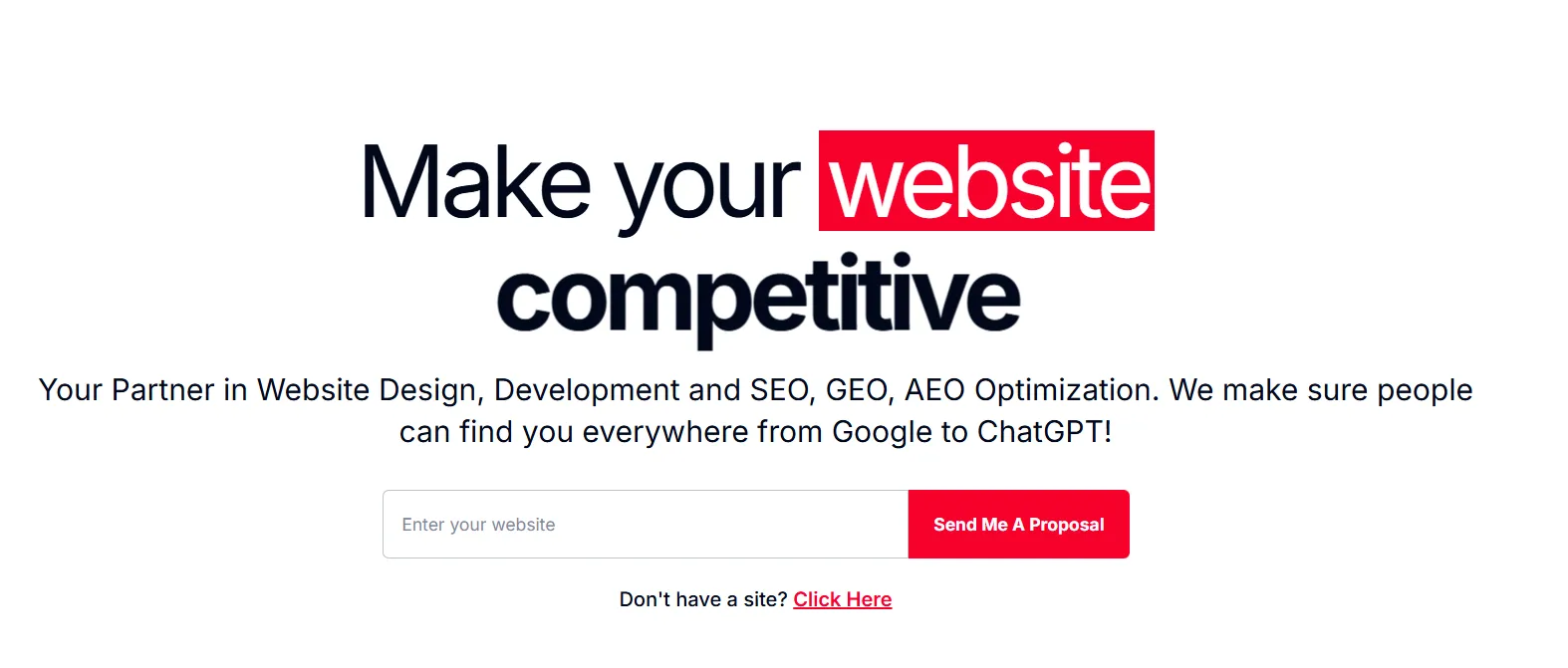
Market-leading in GEO (Generative Engine Optimization), eSEOspace stands out for its innovative approach and success with large-scale and Fortune 500 clients.
eSEOspace builds custom digital ecosystems combining web design, development, SEO, CRMs, automation, and AI tools for platforms like ChatGPT and Gemini. They focus on high design standards, measurable conversions, and continuous learning.
The all-in-one model lets businesses scale across web, app, and software solutions. The tradeoff is stretched focus, higher costs, added complexity, and reliance on fast-changing AI search standards.
Credibility comes from awards and thousands of launches, positioning them as a hands-on, innovation-driven digital partner.
Pros:
- Full-service digital ecosystems with web, app, and software solutions
- Integrates CRMs, automation, and AI SEO for ChatGPT and Gemini
- Strong design focus and measurable conversion improvements
- Credibility from awards and thousands of launches
Cons:
- Broad scope can stretch focus and raise costs
- High complexity for AI search optimization
- Requires client oversight for AI evolution
3. RevenueZen
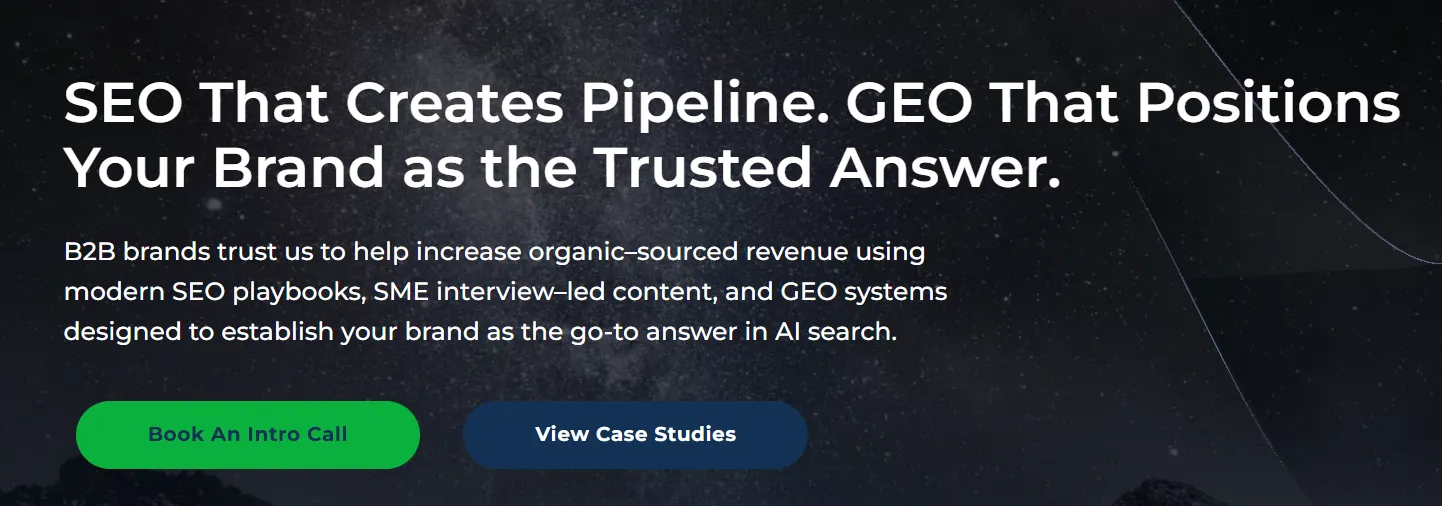
RevenueZen is known for experimentation-led SEO strategies that drive measurable pipeline growth.
RevenueZen helps B2B companies grow revenue through SEO, GEO, and AI-powered content. Its RZ System blends analytics, SME interviews, and proactive strategy to link content to pipeline impact. In one case, they increased their client’s product signups by 50%.
They also produce custom GPTs and brand guides to keep your content campaigns fast and consistent. The approach delivers precision and scalability but demands deep client collaboration, long timelines, and higher budgets.
RevenueZen targets leaders seeking measurable, content-driven growth rooted in human insight and AI data.
Pros:
- AI-driven content systems and GEO expertise
- RZ System links content to pipeline results
- Custom GPTs and brand guides for campaign consistency
- Focused on measurable AI search visibility
Cons:
- Demands deep client collaboration
- Longer timelines and higher budgets
- Complex processes may slow agility
4. Omniscient Digital
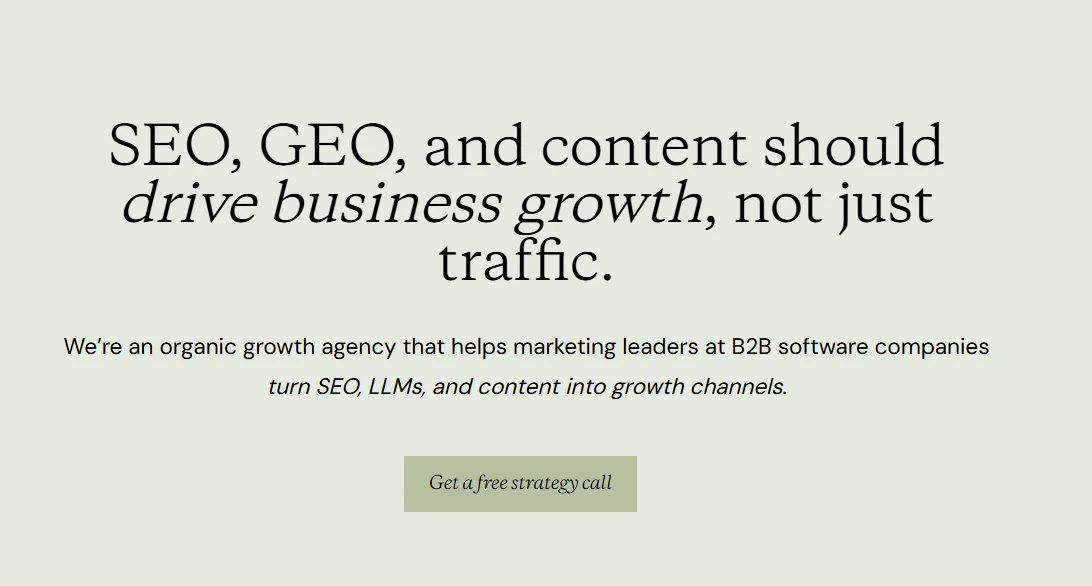
Focusing on B2B SaaS, Omniscient Digital creates content strategies aligned with the AI era.
The agency claims to turn SEO and content into compounding growth engines for B2B software firms. Projects start with deep research on product, competitors, and audience, then move into high-quality content and link building.
Performance dashboards track impressions, traffic, and conversions. Optimization happens continuously, but programs start at $10,000 per month.
Besides, the focus on SEO depth slows results and limits cross-channel expansion. Still, we admit that it delivers sustainable, data-backed growth for complex industries.
Pros:
- Deep research on product, competitors, and audience
- High-quality content and authority-building backlinks
- Detailed dashboards track impressions, traffic, and conversions
- Sustainable, data-backed organic growth
Cons:
- Slower results due to depth over breadth
- Limited cross-channel work
- High monthly investment starting at $10K
5. iPullRank
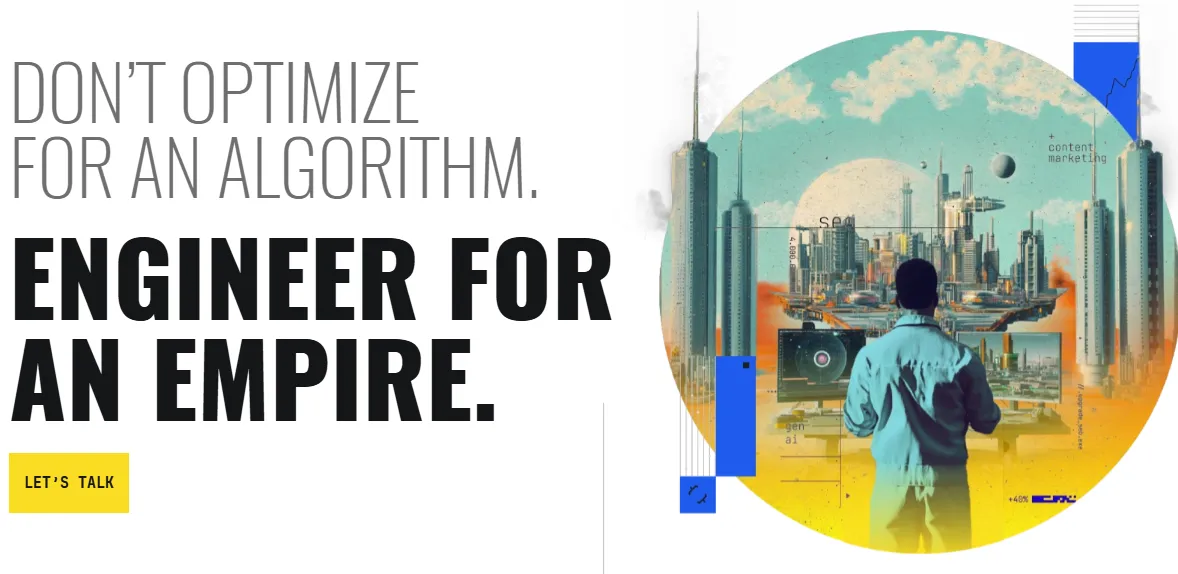
iPullRank is a technical SEO powerhouse, specializing in enterprise solutions.
iPullRank calls its approach “Relevance Engineering,” combining AI, UX, digital PR, and information retrieval to make brands visible everywhere, including in AI search systems like ChatGPT.
Their AI search manual is also worth exploring.
The agency builds authority and trust through content quality and technical alignment. This helps future-proof your search strategy but requires technical expertise and investment in emerging, sometimes opaque AI processes.
iPullRank combines creativity and technical precision well, though relevance metrics do not always translate cleanly into traffic or sales.
Pros:
- Combines AI, UX, digital PR, and technical SEO
- Focuses on authority and trust, not just rankings
- Future-proof AI search strategy
- Creative and technical expertise
Cons:
- Requires a strong technical understanding
- Emerging AI processes can be opaque
- Hard to directly link relevance metrics to traffic or sales
6. WebFX
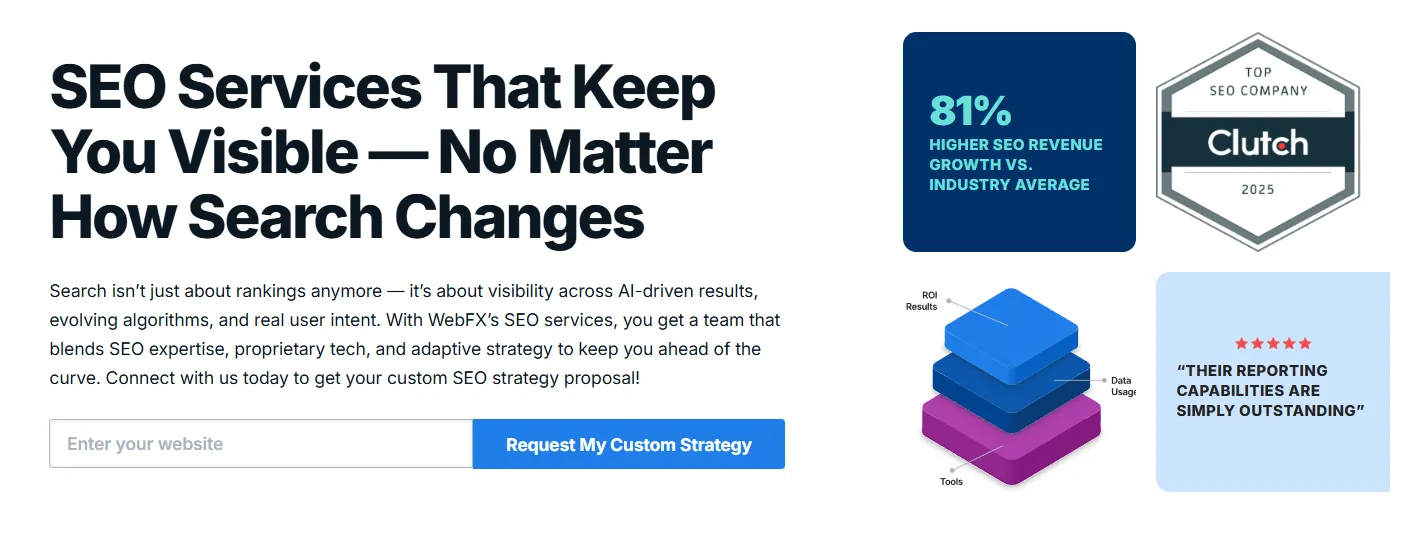
WebFX delivers full-service SEO with a focus on AI-powered optimization.
WebFX is a massive full-service agency offering SEO, PPC, social media, CRO, and web design. RevenueCloudFX links marketing activity directly to revenue for clear ROI.
The 500+ person team and major tech partnerships drive billions in client revenue. Scale allows robust, data-driven service but can reduce personal attention and transparency.
It suits businesses seeking measurable, multi-channel growth. Smaller clients may struggle with the scope and complexity.
Pros:
- Full-service agency covering SEO, PPC, social, CRO, and web design
- RevenueCloudFX links marketing to revenue
- 500+ specialists with tech partnerships
- Proven billions in client revenue
Cons:
- Large scale may reduce personal attention
- Can feel complex or overwhelming for smaller clients
- Reliance on in-house systems may limit transparency
7. First Page Sage
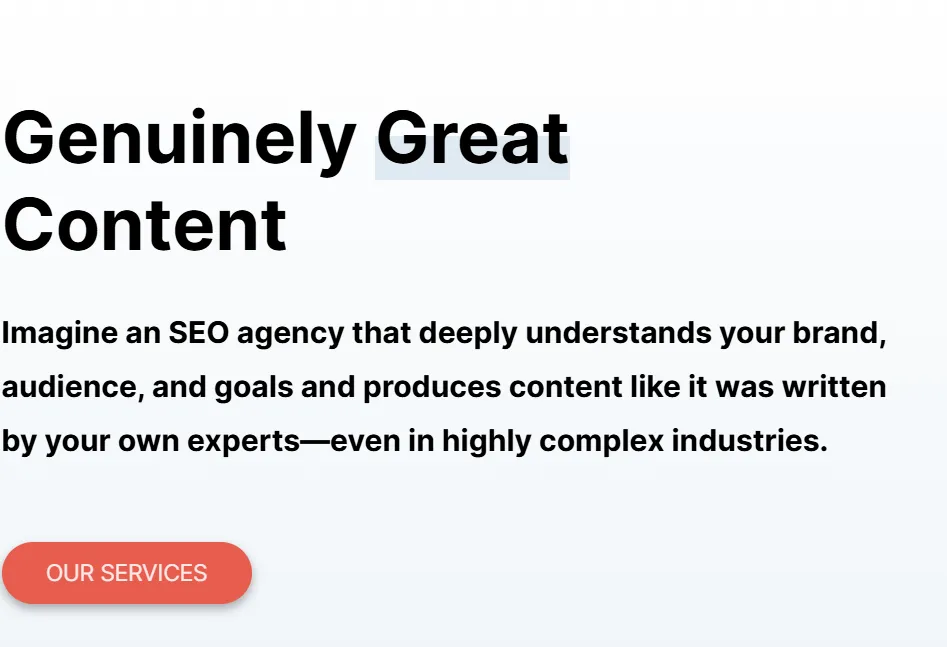
First Page Sage is recognized for thought leadership content that earns trust from audiences and from AI systems.
The company combines SEO expertise with thought-leadership content for B2B brands in complex fields. AI and machine learning drive research while expert writers create high-authority content.
That’s why, for example, for companies like iGPS, they delivered 5x improvement in overall visitor-to-lead conversion rate.
They manage the full system, including strategy, funnel optimization, and reporting. The result is sustained brand trust and authority.
However, high costs and slower ROI limit appeal for smaller or consumer-focused brands. It may be a good fit if you’re prioritizing expertise and long-term credibility over quick wins. As such, Bluethings is a better overall choice.
Pros:
- Combines SEO strategy with thought-leadership content
- Uses AI and ML for research insights
- Full organic system management, including reporting and funnels
- Builds long-term authority and brand trust
Cons:
- High costs
- Slower ROI
- Less relevant for simpler or consumer-focused brands
8. Flow Agency (Formerly Flow SEO)
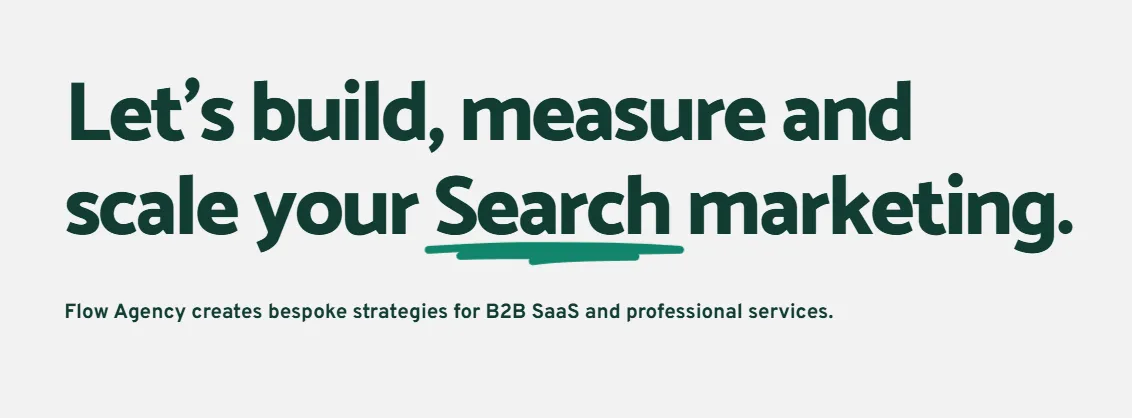
The former Flow SEO brings a balanced strategy, integrating organic and paid campaigns through an AI-enhanced framework.
Flow SEO unifies SEO, GEO, and LLM optimization for AI-driven search visibility. Their strategy covers technical SEO, content, outreach, and paid media. That’s thanks to its founder’s experience: Viola Eva is a renowned SEO professional.
As such, clients benefit from cohesive planning and early AI positioning.
The tradeoff can be a more complex coordination and uncertainty around GEO standards.
The agency suits growth-focused B2B brands seeking measurable leads and alignment with generative AI trends.
Pros:
- Integrates SEO, GEO, and LLM optimization for AI search
- Covers technical SEO, content, outreach, and paid campaigns
- Cohesive strategy for early AI visibility
- Aligns organic and paid marketing
Cons:
- Complex coordination required
- Uncertain GEO standards
- Continuous adaptation to AI search changes
9. Growth Marshal
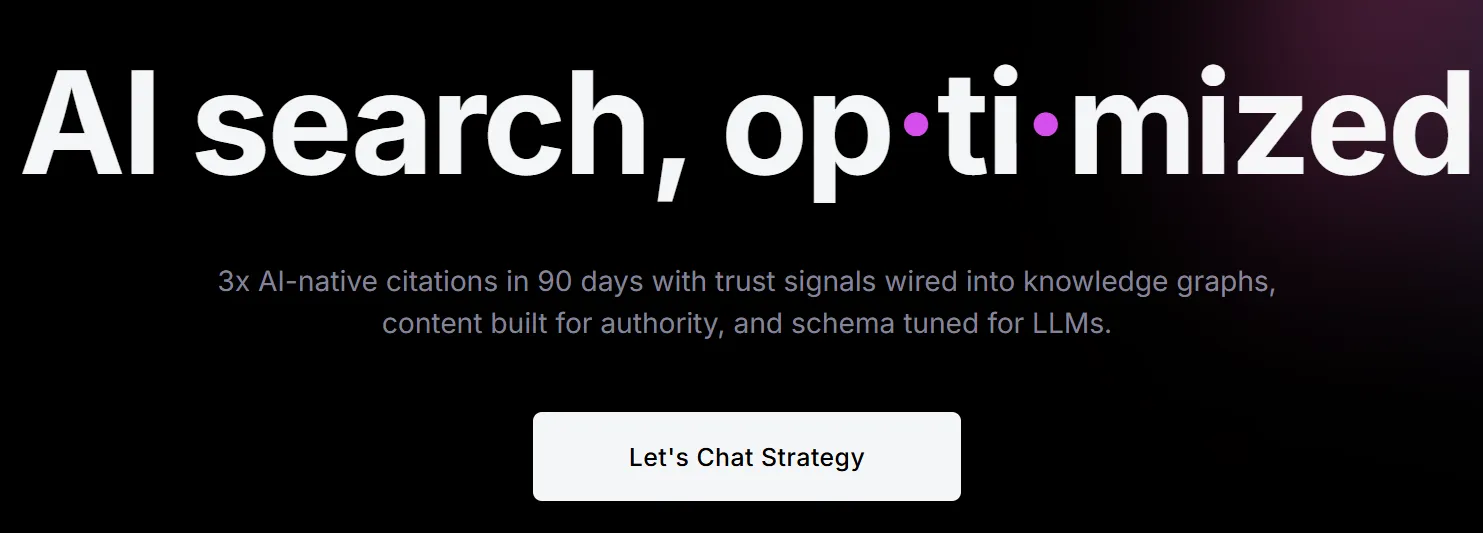
As a pure-play AI SEO agency, Growth Marshal is purpose-built for startups.
Growth Marshal engineers brands for visibility inside large language models using TRUST STACK™, ZERO CLICK™, SIGNAL™, schema, and structured data.
The approach builds measurable citations and AI authority. It demands technical literacy, constant monitoring, and comfort with platform opacity.
Growth Marshal works best for companies willing to trade simplicity for deep AI integration and control over machine-readability.
Pros:
- Specialized in AI search optimization
- Structured frameworks like TRUST STACK™, ZERO CLICK™, SIGNAL™
- Builds measurable citations and AI authority
- Deep integration with knowledge graphs and schema
Cons:
- Requires advanced technical literacy
- Needs constant monitoring
- High complexity and platform opacity
10. NoGood

NoGood is a growth marketing agency that’s gone all-in on AI, investing heavily in Answer Engine Optimization (AEO) and AI-mention tracking.
NoGood deploys “growth squads” combining performance marketing, creative, and analytics to drive measurable growth for startups, scale-ups, and Fortune 500s.
This fast, experiment-driven style delivers rapid results but can favor short-term wins over long-term brand building.
Luckily, the agency also covers paid media, branding, and social campaigns to mitigate that disadvantage. Of course, the corresponding price can be very high.
Pros:
- Flexible “growth squads” with creative, analytics, and performance marketing
- Covers SEO, AEO, paid media, branding, and social campaigns
- Rapid experimentation and measurable results
- AI-powered insights for scalable growth
Cons:
- Short-term performance focus may affect long-term brand building
- Wide scope can increase complexity
- Results may require ongoing experimentation
How to Choose the Right AI SEO Agency
Choosing an AI-powered SEO agency can define your performance in generative search.
As we’ve seen so far, AI SEO goes beyond traditional SEO.
It optimizes content, site structure, and data, indeed, but it does it for large language models, answer engines, and AI-first search platforms.
Pick the wrong partner and budgets get wasted, results slow, and content fails to rank. To avoid that:
- Start with clear objectives. Are you chasing AI snippet visibility, higher organic traffic, or stronger search authority? Define goals before evaluating agencies.
- Assess their expertise. Look at generative engine optimization, AI content frameworks, and structured data implementation. Review case studies in industries like yours. Focus on measurable outcomes: AI visibility growth, snippet inclusion, and improved conversions.
- Communication matters. Real-time dashboards, clear analytics, and actionable insights let you track performance and pivot quickly. Check if they integrate with your tools or provide access to proprietary platforms.
- Consider scalability, retainer models, and cost. Strong partnerships rely on transparency, flexibility, and measurable impact. Go with a partner that delivers both strategy and execution.
Tactical Checklist
Picking the right agency can make the difference between wasted spend and measurable results.
Know what to look for before you sign.
- Set contract terms: Define scope, deliverables, termination clauses, and intellectual property. Build in flexibility for iterative AI campaigns.
- Secure tool access: Understand which platforms they use for auditing, content optimization, and monitoring. Confirm whether you get read-only or full access.
- Demand reporting dashboards: Ask for weekly or real-time dashboards that show AI-specific metrics, structured data coverage, snippet performance, and content visibility.
- Track the right KPIs: Monitor AI snippet inclusion, organic traffic, LLM mentions, schema coverage, conversion rate, and content engagement. Ensure every KPI aligns with your business goals.
Pricing expectations & Common Engagement Models
Understanding agency pricing upfront protects your budget and keeps projects on track.
Know the costs before you commit.
- Lock in a retainer: $5K–$25K per month for ongoing strategy, content, and optimization. Works best for long-term partnerships, but insist on clear milestones and accountability.
- Scope a project: Fixed price for audits, migrations, or GEO work. Ideal for defined projects, but demand clarity on scope to prevent hidden costs.
- Tie to performance: Fees linked to KPIs like snippet capture or traffic growth. Always combine with a base retainer and lock in how success will be measured.
Validating agency claims step-by-step
Don’t take agency claims at face value. Dig in to see what they’ve actually delivered.
- Ask the tough questions: What proprietary tools do they use? Which AI platforms have they optimized for? Can they show real client outcomes?
- Check the data: Request case studies with before-and-after metrics, content audits, schema reports, and AI snippet captures.
- Verify results yourself: Use Ahrefs or SEMrush for backlinks and keywords, GA4 for traffic, and Screaming Frog for technical audits. Compare claimed improvements with independent data to confirm accuracy.
Red flags & negotiation tips
Watch out for warning signs before you commit to anything. The wrong agency can cost time and money.
- Spot the red flags: Avoid agencies promising instant AI rankings, hiding dashboards, or lacking case studies.
- Check the details: Steer clear of vague pricing or unclear deliverables.
- Negotiate smart: Ask for phased payments tied to measurable milestones, regular reporting, and clear ownership of content and data.
- Prioritize transparency: Look for references and agencies that can explain AI SEO in plain language.
Future-Proofing Your SEO Strategy with AI
AI SEO focuses on optimizing your website for AI-driven search experiences. As such, your website appears in AI Overviews, SGE results, and LLM-generated answers.
Solid agencies use many tactics, but basically it’s about structuring your pages so AI systems can interpret, cite, and reuse them as trusted sources.
In short, AI SEO ensures your brand stays visible where users now search: inside generative results, not just Google SERPs.
Every agency has its strengths. Some excel in AI content strategy, others in technical SEO or AI-specific optimization. Each comes with tradeoffs in cost, speed, or complexity.
Bluethings stands out for combining deep industry expertise, white-hat strategies, and scalable AI and traditional SEO. We focus on measurable outcomes and long-term growth, even if we have plenty of quick wins, too.
Remember: Success starts with strategy and data. Strong content, link-building, and structured technical SEO all matter. Our approach pairs human expertise with AI insights, ensuring your brand ranks today and stays visible as AI search evolves.
Contact Bluethings today to see how expert AI SEO can strengthen your strategy and secure long-term visibility.
FAQs
1. How does Google’s AI Overview affect search performance?
Google’s AI Overview changes how users discover information, prioritizing conversational and authoritative sources. Brands need structured, expert-driven content to stay visible and sustain search traffic.
2. What is the Search Generative Experience (SGE)?
SGE is Google’s generative search model that delivers AI-written summaries and follow-up questions. It favors well-structured, intent-driven pages that provide clear value and verified citation sources.
3. How can I protect my current visibility in generative engines?
Prioritize foundational optimizations like internal linking, schema markup, and fast load times. Pair these with conversational content and strong brand mentions to maintain visibility as generative engines evolve.
4. How can AI SEO tools support my content team?
AI SEO tools help your content team identify keyword intent, faster indexing opportunities, and traffic risk. Use data-backed roadmaps and custom dashboards to refine your ongoing strategies, though.
5. What type of content works best for Google rankings now?
Expert-driven blog posts and long-form guides that demonstrate authority and match search relevance perform best. Google increasingly rewards unique insights and well-organized content experiences. Use clear formatting like bullet points, subheadings, and expert citations to make your pages easier for both readers and search engines to interpret.
6. How can we turn search visibility into qualified leads?
Focus on aligning your content with user intent. Conversational, value-rich pages built around market trends and clear CTAs can turn organic visibility into steady, qualified leads.
7. Why are chat interfaces becoming key for online presence?
With conversational search rising, chat interfaces enhance engagement by mirroring how users explore topics. Integrating them supports both discovery and retention within Google’s search experience.


